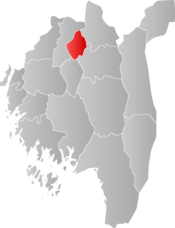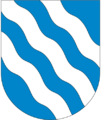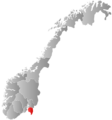Askim facts for kids
Quick facts for kids
Askim kommune
|
|||
|---|---|---|---|
|
Municipality
|
|||
|
|||

Askim within Østfold
|
|||
| Country | Norway | ||
| County | Østfold | ||
| District | Smaalenene | ||
| Administrative centre | Askim | ||
| Area | |||
| • Total | 69 km2 (27 sq mi) | ||
| • Land | 66 km2 (25 sq mi) | ||
| Area rank | #409 in Norway | ||
| Population
(30. June 2014)
|
|||
| • Total | 15,511 | ||
| • Rank | #71 in Norway | ||
| • Density | 225/km2 (580/sq mi) | ||
| • Change (10 years) | 9.0% | ||
| Demonym(s) | Askiming | ||
| Time zone | UTC+01:00 (CET) | ||
| • Summer (DST) | UTC+02:00 (CEST) | ||
| ISO 3166 code | NO-0124 | ||
| Official language form | Bokmål | ||
| Website | |||
|
|
|||
Askim is a town in Norway. It used to be its own municipality (like a local government area). From January 1, 2020, Askim became part of the new Indre Østfold municipality. It is located in the county of Østfold.
The town of Askim was the main center for the Askim municipality. It was created as a municipality on January 1, 1838.
Askim is the biggest town in the Indre Østfold area. In 2012, it had 15,315 people living there. It serves as an important center for nine municipalities in the region. The town is next to Glomma, which is the longest river in Norway. This river forms a border with other areas.
Askim makes a lot of hydroelectricity. This is electricity made from the power of moving water. There are three dams and hydroelectric power plants on the Glomma river in Askim. These are called Solbergfoss, Kykkelsrud, and Vamma.
Around the year 1900, people used to nickel mine for nickel at Kykkelsrud. This area is also one of the few places where a special rock called "Spheroidal Norite" (also known as "Potato Stone") can be found.
For most of the 1900s, Askim was an industrial town. A big employer was Viking Gummi. This company made rubber products like boots and tires. However, they stopped making rubber products in 1991. Later, by the 2010s, Glava became the main employer. They make glass cotton insulation, which is used to keep buildings warm or cool.
Contents
History
Askim has always been an important place during wars. This is because it was a relatively easy place to cross the Glomma river. The last battle between Norway and Sweden happened here. It was fought at the crossing over Glomma on August 9, 1814. Today, there is a yearly event where people act out this historical battle. There is also a stone monument at Langnes to remember it.
During World War II, a battle took place at Fossum Bridge in April 1940. The Norwegian Army bravely defended the bridge against the invading German soldiers.
Name
The name Askim comes from an old farm. The first church in the area was built there. In Old Norse, the name was Askheimr. The first part, askr, means "ash tree". The second part, heimr, means "home" or "farm". So, Askim means something like "ash tree farm".
Coat-of-arms
Askim's coat-of-arms is quite new. It was officially approved on November 1, 1963. The design shows the three large waterfalls in the municipality. These are the Solbergfoss, Kykkelsrudfoss, and Vammafoss. The rivers and waterfalls are also used to create hydroelectric power.
Transportation
The main road, European route E18, used to go right through the center of Askim. But in 2005, the road was made bigger with four lanes. Now, it runs outside the town center. The Vy train company's Eastern Østfold Line serves Askim. There are train stops at Langnes Station, Næringsparken, and Askim Station.
Attractions
- Østfoldbadet (a water park)
- Askim videregående skole (a high school)
- Askimtorget (a shopping center)
- Askim Golf Course
Twin towns — sister cities
Askim has special connections with other cities around the world. These are called twin towns or sister cities:
 - Huddinge, Stockholm County, Sweden
- Huddinge, Stockholm County, Sweden - Lyngby-Taarbæk Kommune, Region Hovedstaden, Denmark
- Lyngby-Taarbæk Kommune, Region Hovedstaden, Denmark - Nuuk, Nuuk Municipality, Greenland
- Nuuk, Nuuk Municipality, Greenland - Rapla, Rapla County, Estonia
- Rapla, Rapla County, Estonia - Seyðisfjörður, Seyðisfjarðarkaupstaður, Iceland
- Seyðisfjörður, Seyðisfjarðarkaupstaður, Iceland - Vantaa, Uusimaa, Finland
- Vantaa, Uusimaa, Finland
Notable people
Images for kids
See also
 In Spanish: Askim para niños
In Spanish: Askim para niños
 | Selma Burke |
 | Pauline Powell Burns |
 | Frederick J. Brown |
 | Robert Blackburn |



